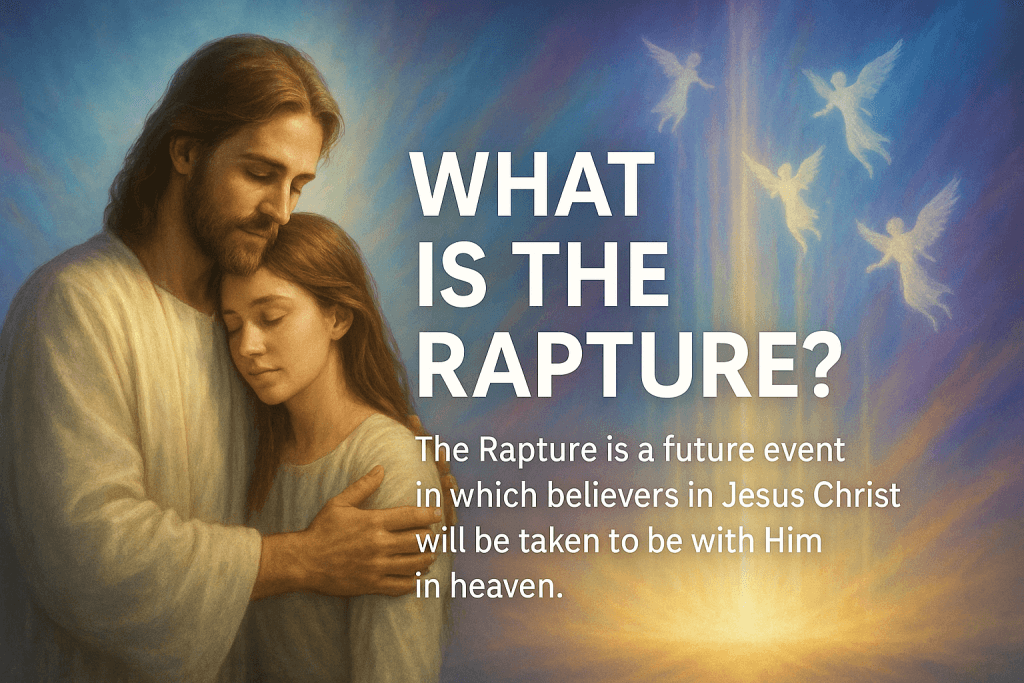The Pretribulation
Rapture
What is the Rapture?

The most common question people ask is, “What is the Rapture?”
The Rapture is a future event in which believers in Jesus Christ—both those who have died and those who are alive—will be instantly transformed, given glorified spiritual bodies, and supernaturally taken from Earth to be with the Lord in heaven (1 Thessalonians 4:16–17). Another name for this event is “The Blessed Hope” (Titus 2:13).
The Rapture as a Wedding
The Rapture is best understood in terms of a wedding. Jesus Christ is the groom, the Church is His bride, and the wedding guests are the Old Testament saints. In simple terms, the Rapture is the moment when the groom comes to take His bride away from Earth to His Father’s house in heaven, where they will be united for all eternity. This celebration will culminate in the Marriage Supper of the Lamb (Revelation 19:7–9).
Is the Rapture Biblical?
Some people mistakenly believe that the Rapture is a non-biblical concept, or that it is identical to the Second Coming of Christ. Others believe the Church must endure the seven-year Tribulation (Daniel’s 70th Week) before being taken to heaven.
However, the Rapture is entirely biblical. In 1 Thessalonians 4:17, the phrase “caught up” comes from the Greek word harpazō, meaning “to seize suddenly or snatch away.” When translated into Latin, the word became rapturo, which is where we get the English term “Rapture.”
Insights from Don Mills’ Precepts of the Blessed Hope
In his book, Precepts of the Blessed Hope, Don Mills goes far beyond listing reasons and proofs for a pre-tribulation Rapture. He masterfully uncovers Old Testament types and foreshadows that point to the Blessed Hope—showing again and again that Christ will return for His bride before the Tribulation begins.
Mills also clarifies important biblical distinctions:
- The difference between Christ as the Son of Man (in His earthly role) and the Son of God (in His heavenly role).
- The difference between God’s earthly promises to Israel and His heavenly promises to the Church.
This helps readers gain a deeper understanding of prophecy—past, present, and future.
Avoiding Misconceptions
A correct understanding of prophecy depends on recognizing the audience to whom Jesus or the prophets were speaking—whether Jews, Gentiles, or the Church. Mills’ work carefully dismantles common misconceptions and provides clarity that is invaluable to serious students of God’s Word.
Why the Rapture Matters
Far from being a fringe idea, the Rapture is central to Christian hope. It offers assurance that believers will be spared from God’s wrath during the Tribulation (1 Thessalonians 5:9) and motivates Christians to live in watchful readiness.
Bonus Content
Coming Soon,:
- List of Key Bible verses about the Rapture (1 Thessalonians 4:16–17, 1 Corinthians 15:51–52, John 14:1–3).
- Infographic / Timeline showing the distinction between the Rapture and the Second Coming.
- Video thumbnails: links from well-known pastors and teachers to vidoes explaining the Rapture.
- Recommended Reading List : Don Mills’ Precepts of the Blessed Hope, John Walvoord’s The Rapture Question, Hal Lindsey’s The Late Great Planet Earth).
- FAQ section: Answering common questions and objections.heaven.
Frequently Asked Questions About the Rapture
Q: What signs point to the Rapture?
A: While no one knows the exact day or hour, the Bible describes a season of prophetic signs—including global upheaval, Israel’s rebirth, and spiritual deception—that indicate the Rapture is near (Matthew 24:32–33).
Q: Is the word “Rapture” in the Bible?
A: No, the English word “Rapture” does not appear in most Bible translations. The term comes from the Latin word rapturo, which translates the Greek word harpazō (“caught up”) found in
1 Thessalonians 4:17.
Q: How is the Rapture different from the Second Coming?
A: The Rapture is when Christ comes for His Church, removing believers from the earth to meet Him in the air. The Second Coming occurs at the end of the Tribulation, when Christ returns with His saints to establish His kingdom on earth (Revelation 19:11–16).
Q: Will the Church go through the Tribulation?
A: From a Pre-Tribulation perspective, the Church will not go through the seven-year Tribulation. Scripture teaches that believers are not appointed to God’s wrath (1 Thessalonians 5:9).
Q: Why is the Rapture called the “Blessed Hope”?
A: Titus 2:13 calls the expectation of Christ’s return “the Blessed Hope.” It is a source of encouragement, reminding believers that their ultimate destiny is to be united with Christ in heaven.

